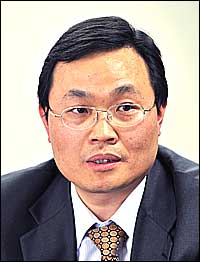‘Next leader should focus on growth’

While chaebol bashing has become fashionable as Koreans prepare to elect a new president in December, Hyundai Research Institute head economist Yu Byoung-gyu believes that more discussions should be devoted to finding ways for the country to tackle the era of low growth and the challenges of an increasingly top-heavy population. Korea Times photo by Kim Dong-ho
Politicians are finding it fashionable to villainize big businesses with the clock ticking on the presidential elections in December, but one senior economist claims this exposes their ineptitude in reading voters’ minds.
The phrase “economic democracy” has become a buzzword for parties from left and right as they compete with new ideas to lessen the concentration of wealth and power to the mighty chaebol, or family-owned conglomerates, and restore a sense of parity into Korea’s Darwinist business scene.
This represents a dramatic reversal in a country that had cringed at the sights and sounds of communism and highlights the growing discontent over scourges of inequality and evaporating belief in social mobility.
But Yu Byoung-gyu, head economist and vice president at the Hyundai Research Institute (HRI), believes that chaebol bashing for the sake of bashing probably wouldn’t carry political parties too far when creditcrunched voters are desperate for real solutions to their problems rather than just ego-massaging slogans.
“I am not denying that reforming chaebol is an important subject. It certainly is and this election is a good opportunity to get these arguments advanced,” said Yu in a telephone conversation.
“But it’s also obvious that the discussions should proceed with the clear purpose of finding better ways to boost economic activity, create more jobs and restore Korea’s attractiveness as a destination for foreign investment.
We are getting a bunch of headlines from the political parties and not enough details.” The original idea of economic democracy describes a socio-economic arrangement in which businesses are democratically managed and worker-owned.
But the term has been used more loosely in Korea where politicians debate ways to combat the problems stemming from the unequal enrichment of households and companies.
Yu wonders whether the talks would prove as all rhetoric and no action. He also questions whether voters would be that much interested about the talks of corporate sector justice when many of them continue to reel from an acute squeeze in living standards.
The Korean economy has been facing a disastrous vortex of falling exports, collapsing consumption, historically-high household debt and unemployment.
And this doesn’t even count the ramifications from being the planet’s fastest aging society.
“The subduing of economic activity appears to have people more concerned about economic prospects and whether the government could find solutions to find ways to halt the pullback in growth. Political parties are talking most about economic democracy, but you really have to question whether voters are enthusiastic about this as them,” Yu said.
“About 80 percent of the respondents were skeptical about the welfare-related campaign promises and believed they were just hollow promises, so parties must do better to come up with detailed ideas.” For Korea’s next president, Yu believes he or she, which at least now looks more likely, should focus on reviving the business sector’s ability to create more jobs.
This includes restoring the vibrancy of Korea’s manufacturing scene in both traditional sectors like automotives and electronics and also new growth engines like biotechnology and nano materials.
Jolting entrepreneurship, improving the weak productivity in the non-tradable sectors of the economy and increasing the labor participation of women are also important and will require “customized” policies.
“Another problem is that Korea is no longer a magnet for foreign investment aside of the stock market. We need to rebuild our attractiveness by introducing more tax benefits and convincing workers to accept more flexible types of labor and compensation conditions, such as wage peak systems,” he said. <The Korea Times/Kim Tong-hyung>

























































